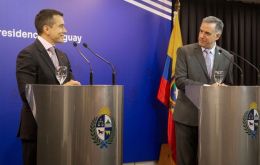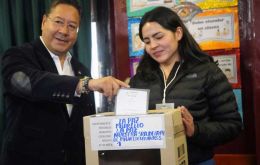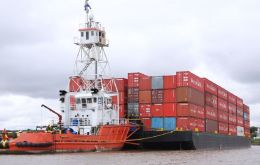MercoPress. South Atlantic News Agency
Latin America
-
Wednesday, August 20th 2025 - 10:33 UTC
Uruguay assumes the Brasilia Consensus' rotating presidency

Foreign Ministers Mario Lubetkin of Uruguay and María Gabriela Sommerfeld of Ecuador participated Tuesday at Montevideo's Torre Ejecutiva in the handover ceremony of the Brasilia Consensus' rotating presidency.
-
Wednesday, August 20th 2025 - 10:27 UTC
Bogotá court orders Uribe's release pending further appeals

A Bogota High Court on Tuesday ordered the immediate release of former Colombian President Álvaro Uribe Vélez, thereby revoking Judge Sandra Heredia's 12-year house arrest sentence that Uribe had been serving after being found guilty of bribery and procedural fraud.
-
Tuesday, August 19th 2025 - 20:27 UTC
US$600 million treasure discovered in Colombian farm

A farmer in the Colombian region of Antioquía region of Colombia has unearthed an astonishing US$600 million in cash. The money was found buried in rusty metal drums while the rural worker, who remains anonymous for security reasons, was doing some digging to expand his crop area.
-
Tuesday, August 19th 2025 - 19:48 UTC
Uruguay and Ecuador sign cooperation agreements

Presidents of Ecuador and Yamandú Orsi of Uruguay on Tuesday signed two bilateral agreements in Montevideo, increasing cooperation and intelligence sharing. The understanding involves the two countries' Ministries of Interior and Defense.
-
Monday, August 18th 2025 - 21:38 UTC
Lula and Noboa discuss trade beyond ideological discrepancies

Brazilian President Luiz Inácio Lula da Silva on Monday welcomed his Ecuadorean colleague Daniel Noboa at the Planalto Palace for a meeting during which both leaders set aside their ideological discrepancies and focused on strengthening trade and cooperation, particularly after Washington's tariffs.
-
Monday, August 18th 2025 - 08:51 UTC
Brazil donating 20 Urutus armored vehicles to Paraguay

Brazil is donating 20 EE-11 Urutu armored vehicles to the Paraguayan Army to help modernize its military and strengthen regional defense cooperation. The donation will increase Paraguay's fleet of Urutu vehicles from 12 to 32.
-
Monday, August 18th 2025 - 08:43 UTC
Canadian Ambassador and Haitian Police Chief discuss cooperation

Haitian National Police (PNH) Acting Director-General Vladimir Paraison and Canada's Ambassador to Port-au-Prince André François Giroux discussed cooperation regarding security issues, particularly training, logistics, and institutional development.
-
Monday, August 18th 2025 - 07:44 UTC
Bolivia headed for runoff between rightwing candidates

Right-wing candidates Rodrigo Paz Pereira and former President Jorge Tuto Quiroga advanced Sunday to an unprecedented runoff after the elections in Bolivia. Preliminary results showed Paz Pereira in front with 32.2% of the vote and Quiroga in second place with 26.9%, which marks a significant shift in Bolivian politics, as it signals the end of two decades of leftist rule by the Movement for Socialism (MAS) party, led by former presidents Evo Morales Aymá and Luis Arce Catacora. The runoff election is scheduled for Oct. 19.
-
Saturday, August 16th 2025 - 10:35 UTC
Former Bolivian minister arrested for illicit enrichment

Former Bolivian Minister of Environment and Water, Alan Lisperguer, was arrested in Cochabamba and transferred to La Paz to face charges of illicit enrichment and knowingly submitting inaccurate affidavits.
-
Saturday, August 16th 2025 - 10:30 UTC
Uruguay interested in increased Paraguayan barge traffic

Uruguay is in talks with Asunción to improve the flow of Paraguayan barge fleet – the world's third-largest – through the port of Montevideo. In addition, extra berths have been requested at the port of Nueva Palmira.
